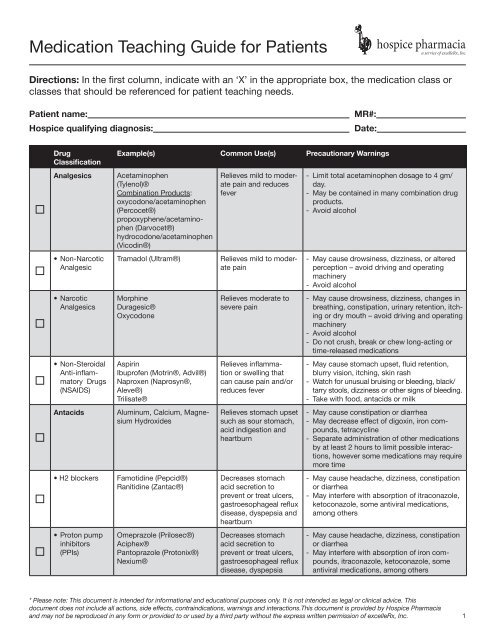Medication Teaching Guide for Patients - Hospice Pharmacia
Medication Teaching Guide for Patients - Hospice Pharmacia
Medication Teaching Guide for Patients - Hospice Pharmacia
- No tags were found...
You also want an ePaper? Increase the reach of your titles
YUMPU automatically turns print PDFs into web optimized ePapers that Google loves.
<strong>Medication</strong> <strong>Teaching</strong> <strong>Guide</strong> <strong>for</strong> <strong>Patients</strong>Directions: In the first column, indicate with an ‘X’ in the appropriate box, the medication class orclasses that should be referenced <strong>for</strong> patient teaching needs.Patient name:<strong>Hospice</strong> qualifying diagnosis:MR#:Date:DrugClassificationAnalgesics• Non-NarcoticAnalgesic• NarcoticAnalgesics• Non-SteroidalAnti-inflammatoryDrugs(NSAIDS)Antacids• H2 blockers• Proton pumpinhibitors(PPIs)Example(s) Common Use(s) Precautionary WarningsAcetaminophen(Tylenol)®Combination Products:oxycodone/acetaminophen(Percocet®)propoxyphene/acetaminophen(Darvocet®)hydrocodone/acetaminophen(Vicodin®)Tramadol (Ultram®)MorphineDuragesic®OxycodoneAspirinIbuprofen (Motrin®, Advil®)Naproxen (Naprosyn®,Aleve®)Trilisate®Aluminum, Calcium, MagnesiumHydroxidesFamotidine (Pepcid®)Ranitidine (Zantac®)Omeprazole (Prilosec®)Aciphex®Pantoprazole (Protonix®)Nexium®Relieves mild to moderatepain and reducesfeverRelieves mild to moderatepainRelieves moderate tosevere painRelieves inflammationor swelling thatcan cause pain and/orreduces feverRelieves stomach upsetsuch as sour stomach,acid indigestion andheartburnDecreases stomachacid secretion toprevent or treat ulcers,gastroesophageal refluxdisease, dyspepsia andheartburnDecreases stomachacid secretion toprevent or treat ulcers,gastroesophageal refluxdisease, dyspepsia- Limit total acetaminophen dosage to 4 gm/day.- May be contained in many combination drugproducts.- Avoid alcohol- May cause drowsiness, dizziness, or alteredperception – avoid driving and operatingmachinery- Avoid alcohol- May cause drowsiness, dizziness, changes inbreathing, constipation, urinary retention, itchingor dry mouth – avoid driving and operatingmachinery- Avoid alcohol- Do not crush, break or chew long-acting ortime-released medications- May cause stomach upset, fluid retention,blurry vision, itching, skin rash- Watch <strong>for</strong> unusual bruising or bleeding, black/tarry stools, dizziness or other signs of bleeding.- Take with food, antacids or milk- May cause constipation or diarrhea- May decrease effect of digoxin, iron compounds,tetracycline- Separate administration of other medicationsby at least 2 hours to limit possible interactions,however some medications may requiremore time- May cause headache, dizziness, constipationor diarrhea- May interfere with absorption of itraconazole,ketoconazole, some antiviral medications,among others- May cause headache, dizziness, constipationor diarrhea- May interfere with absorption of iron compounds,itraconazole, ketoconazole, someantiviral medications, among others* Please note: This document is intended <strong>for</strong> in<strong>for</strong>mational and educational purposes only. It is not intended as legal or clinical advice. Thisdocument does not include all actions, side effects, contraindications, warnings and interactions.This document is provided by <strong>Hospice</strong> <strong>Pharmacia</strong>and may not be reproduced in any <strong>for</strong>m or provided to or used by a third party without the express written permission of excelleRx, Inc.
DrugClassificationAntianxietyAgentsAntiarrhythmicsAntibioticsAnticholinergicsExample(s) Common Use(s) Precautionary WarningsLorazepam (Ativan®)Alprazolam (Xanax®)Clonazepam (Klonopin®)Diazepam (Valium®)Amiodarone (Cordarone®)Propafenone (Rythmol®)Sotalol (Betapace®)Levofloxacin (Levaquin®)Ciprofloxacin (Cipro®)Sulfamethoxazole/Trimethoprim(Bactrim®)AtropineHyoscyamine (Levsin®)Relieves anxiety, helpsinitiate and/or maintainsleepHelps regulate heartrhythmsUsed to treat variousinfections and managesymptoms associatedwith those infectionsManages excessivesecretions- May cause dizziness, drowsiness, confusion,dry mouth – avoid driving and operatingmachinery- Avoid alcohol- Do not stop taking this medication withoutfirst talking to the nurse and/or doctor- May cause low blood pressure, dizziness,drowsiness, nausea, headache, changes inurination- Depending on the specific antibiotics, maycause nausea, vomiting, diarrhea, abdominalpain, cramping, loss of appetite- Various drug interactions may exist, dependingon the specific antibiotic- May cause dry mouth, blurred vision, drowsiness,constipation, urinary retention, weaknessAnticoagulants Warfarin (Coumadin®) Prevents blood clots - May cause GI irritation with anorexia, vomiting,diarrhea, hemorrhage, bleeding, bruising.- Many drug interactions.AnticonvulsantsAntidepressants• TricyclicsPhenytoin (Dilantin®)Carbamazepine (Tegretol®)Valproic acid (Depakote®)To prevent seizures and/or treat nerve pain- May cause nausea, vomiting, changes inblood sugar levels, swollen or tender gums,loss of taste, weight gain, skin rash.- Many drug interactionsLevetiracetam (Keppra®) To prevent seizures - May cause dizziness, drowsiness, headache,diarrhea, loss of appetiteGabapentin (Neurontin®)Amitriptyline (Elavil®)Desipramine (Norpramin®)Nortriptyline (Pamelor®)To prevent seizures and/or treat nerve painTo treat depressionand/or nerve pain- May cause constipation, nausea, slurredspeech, tremors, weight gain, difficulty walking- May cause urinary retention, constipation,weight gain, dry mouth, blurred vision, hypotension,sleep changes, suicidal thoughts inchildren and young adults• SSRIsLexapro®Citalopram (Celexa®)Fluoxetine (Prozac®)Sertraline (Zoloft®)To treat depression• Other Trazodone (Desyrel®) To treat depression,generalized anxiety disorderand insomniaAntidiabeticAgentsInsulinGlipizide (Glucotrol®)Glyburide (Diabeta®)Met<strong>for</strong>min (Glucophage®)To lower blood sugarassociated with diabetesor drug-inducedhyperglycemiaTo lower blood sugarassociated with diabetesor drug-inducedhyperglycemia- May cause nausea, diarrhea, headache,anorexia, dyspepsia, constipation, insomnia,weight loss, sleep changes, suicidal thoughtsin children and young adults- May cause headache, drowsiness, weakness,stomach upset, muscle ache, suicidalthoughts in children and young adults- Watch <strong>for</strong> signs of hypo- or hyperglycemia- Hypoglycemia (low blood sugar): weakness,shaking, sweating, dizziness, hunger, headache,nausea- Hyperglycemia (high blood sugar): thirst,increased urination, abdominal pain, drowsiness,nausea, difficulty breathing- Take as directed with meals- May cause diarrhea, nausea, vomiting, bloating,loss of appetite, metallic taste, weightloss* Please note: This document is intended <strong>for</strong> in<strong>for</strong>mational and educational purposes only. It is not intended as legal or clinical advice. Thisdocument does not include all actions, side effects, contraindications, warnings and interactions.This document is provided by <strong>Hospice</strong> <strong>Pharmacia</strong>and may not be reproduced in any <strong>for</strong>m or provided to or used by a third party without the express written permission of excelleRx, Inc.
















